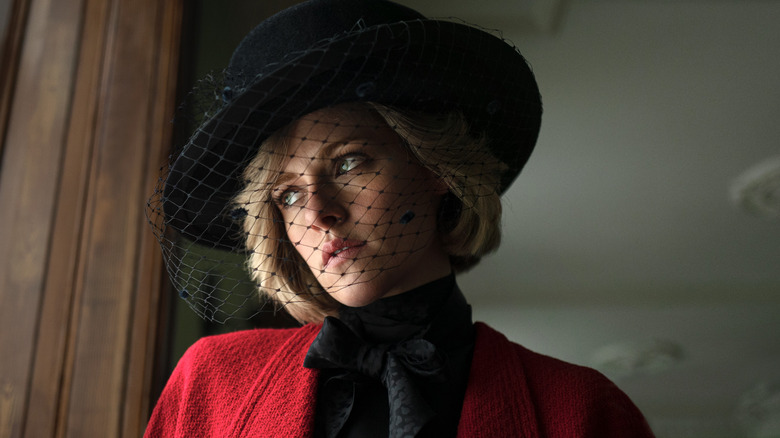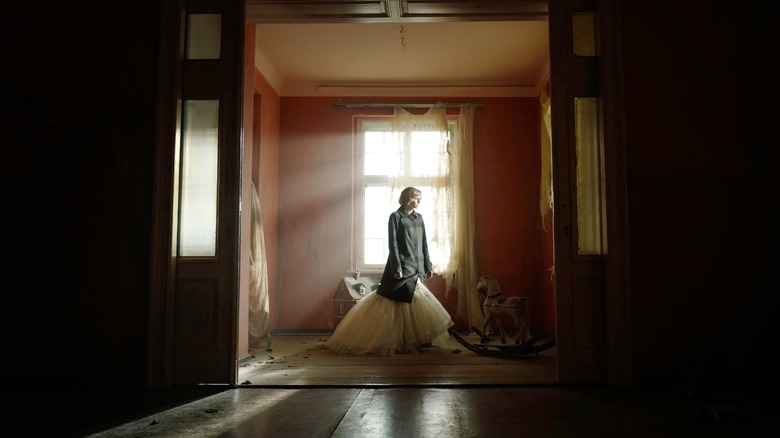
Princess Diana wanders through the ornate but empty halls of the Sandringham Estate, a living ghost in an expensive gown. She drifts, she sways, she dances. She is haunted by a million different memories and the anxieties of what might come. Not far from here, her family home still stands – abandoned and boarded up like a haunted house. A little farther from that, a scarecrow stands in an empty field. When she first arrived here, the scarecrow was clad in one of her father's jackets. She is surrounded by people in this sprawling castle-like building. And she is alone.
Pablo Larraín's "Spencer" follows Diana, as played by Kristen Stewart, during one long, terrible Christmas weekend with the royal family. We seem to be inundated with Diana-themed dramatizations lately. Diana finally arrived as a character on the most recent season of "The Crown." There's a musical about her headed to Netflix. And then there's "Spencer," a haunting, melancholy film about a royal on the verge of a nervous breakdown. Larraín's film begins with a bit of text telling us this is "A fable from a true tragedy." The "fable" angle implies that this didn't really happen -- at least not exactly as it's portrayed here. But it feels real. It even feels real when things dip into the surreal.
Diana is an outsider. She was wealthy by birth, of course. And her father was a nobleman, the 8th Earl Spencer. But as presented here, and in other dramatizations of her life, she never quite fits with the royal family she marries into. Her marriage to Prince Charles may have produced two sons, but it was seemingly loveless, ending with divorce. Perhaps when the relationship first began, Diana was able to fake it until she made it, politely trying to integrate herself into the family. But by the time we meet her in "Spencer," that's no longer a possibility. She's utterly alone -- she drives herself to the estate while the other royals all come in a gaggle. And she's unable to keep up a mask of contentment, or even sanity. She seems as if she's one bad moment away from completely losing her mind.
"Spencer" is a kind of companion piece to Larraín's "Jackie," which followed another historical female figure struggling over a period of a few terrible days. But they are ultimately quite different stories. "Jackie" was the tale of a woman embracing tradition and ceremony in grief, as she stages an elaborate state funeral for her murdered husband. "Spencer," in contrast, is about a woman who is suffocated by ceremony. There are rules to being a royal, and Diana can't seem to grasp them. When she arrives for the weekend, she's immediately asked to get the ball rolling by taking part in a "fun" tradition -- those attending the Christmas weekend getaway must weigh themselves when they enter and then once again when they leave, to see who gained the most holiday weight.
The implication is that if you've packed on a bunch of pounds feasting on sweets you've had a grand old time. But Diana, who suffers from an eating disorder, wants nothing to do with this. Her stance against the weighing is blunted by the all-seeing Major Gregory (Timothy Spall), an equerry who has been ordered to keep an eye on Diana. In Gregory's eyes, and the eyes of those he serves, no one is above tradition. Later in the film, he tries to explain to Diana why he's such a stickler for the rules: they're for the good of the country. Or so he believes.
Stewart adopts a breathy, posh accent to play the princess, and whether or not she sounds exactly like the real Diana is immaterial. It's the physicality Stewart brings to the part that turns her Diana into a living, breathing being. She fidgets, she toys with her hair and jewelry, she breathes heavily. She is a woman unable to be comfortable around others. This is a raw, brilliant performance, so entirely embodying the character that it starts to seem less like acting and more like possession. Stewart has never been better than she is here.
Ghosts, Sadness, And Brief Glimmers Of Hope

While the royals aren't presented as overtly cruel here -- save for Charles (Jack Farthing), who is constantly staring daggers into his wife -- they're not exactly warm, either. They simply cannot understand Diana. They can't fathom what's going on in her head. And while they can clearly see she's unwell, they seem to write this off as a woman being overly hysterical. Charles calls her a spoiled child who wants attention, and chastises her for leaving her curtains open in her bedroom, lest someone looks in. But attention is the last thing this Diana wants.
There are those within the walls of Sandringham who offer kindness to Diana. There's Maggie (Sally Hawkins), a dresser who is warm enough to Diana to have become a confidant. There's the head chef, played wonderfully by Sean Harris, who tries to offer helpful advice to Diana as she spirals. And then there are Diana's two sons, who clearly love her unconditionally, and also try to help her pull herself together long enough to make an appearance at one of the many, many fancy dinners that happen over the Christmas getaway. But these brief kindnesses can't remedy Diana's stormy mind, or calm her nervous heart.
Diana is haunted, emotionally, mentally, and even literally. She finds herself seeing the ghost of Anne Boylen, the Queen of England who was beheaded by Henry VIII after he decided he wanted another wife. Diana sees herself in Anne -- her husband, too, is in love with another woman, and not shy about hiding it. And while Diana may not run the risk of literally losing her head like Anne, she is in serious danger of losing her mind. Larraín represents this with surreal touches, like when Diana imagines she rips off a pearl necklace Charles bought for both her and his lover. The scattered pearls fall into a bowl of soup that looks exactly like the stuff Linda Blair vomited up in "The Exorcist," at which point Diana digs in her spoon, bringing a green-coated pearl into her mouth and biting down on it with a terrible crunch.
And whenever she eats, she runs off to the bathroom to purge. She cuts her skin with bolt cutters -- or does she? The wound vanishes, but later, someone comments that she's been "cutting herself again." What's real and what's part of Diana's fractured mind is always in question, resulting in a dreamy, strange atmosphere. Claire Mathon's cinematography is foggy and faded and lush, giving the entire movie the look of something long lost but now remembered. And Jonny Greenwood's score is unnerving, horror movie music in disguise.
"Spencer" is an ultimately sad film, but that's not to say it's a non-stop misery train. While we all know the eventual tragedy that will befall Diana, there are glimmers of light that peek through, just like the light Diana struggles to find when servants sew up her bedroom curtains after she keeps refusing to keep them shut. One of the film's final moments, which involves an unexpected pop song, is so wonderfully light, like a sudden cool breeze on a stifling day, that it radiates a kind of wholesome power.
Stewart's Diana is an unhinged, hopeless, lonely tragic figure in a desperate search of some sort of friendliness, some sort of understanding, some sort of love. And she will eventually find it, however fleeting. But the fleeting moments are the ones that often end up meaning the most to us. The ones who tuck away in our hearts, keeping them there like an ember of fire ready to be stoked. "Spencer" will break your heart, but it will bring it warmth, too.
/Film Rating: 9 out of 10
Read this next: Spencer Trailer: Kristen Stewart Is Very Sad As Princess Diana
The post Spencer Review: Kristen Stewart Gives a Raw, Brilliant Performance in This Haunting Fable [TIFF 2021] appeared first on /Film.
0 Comments